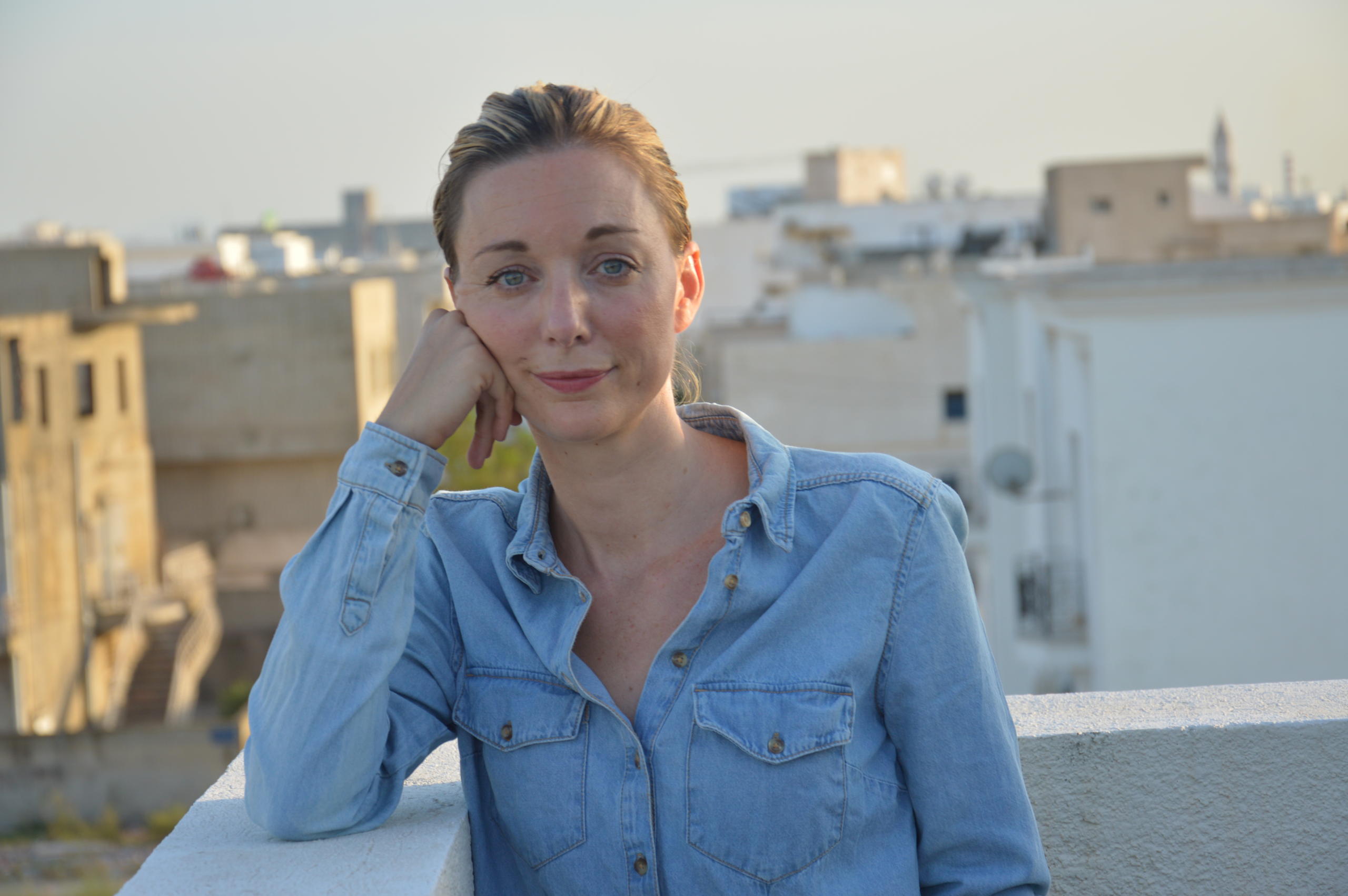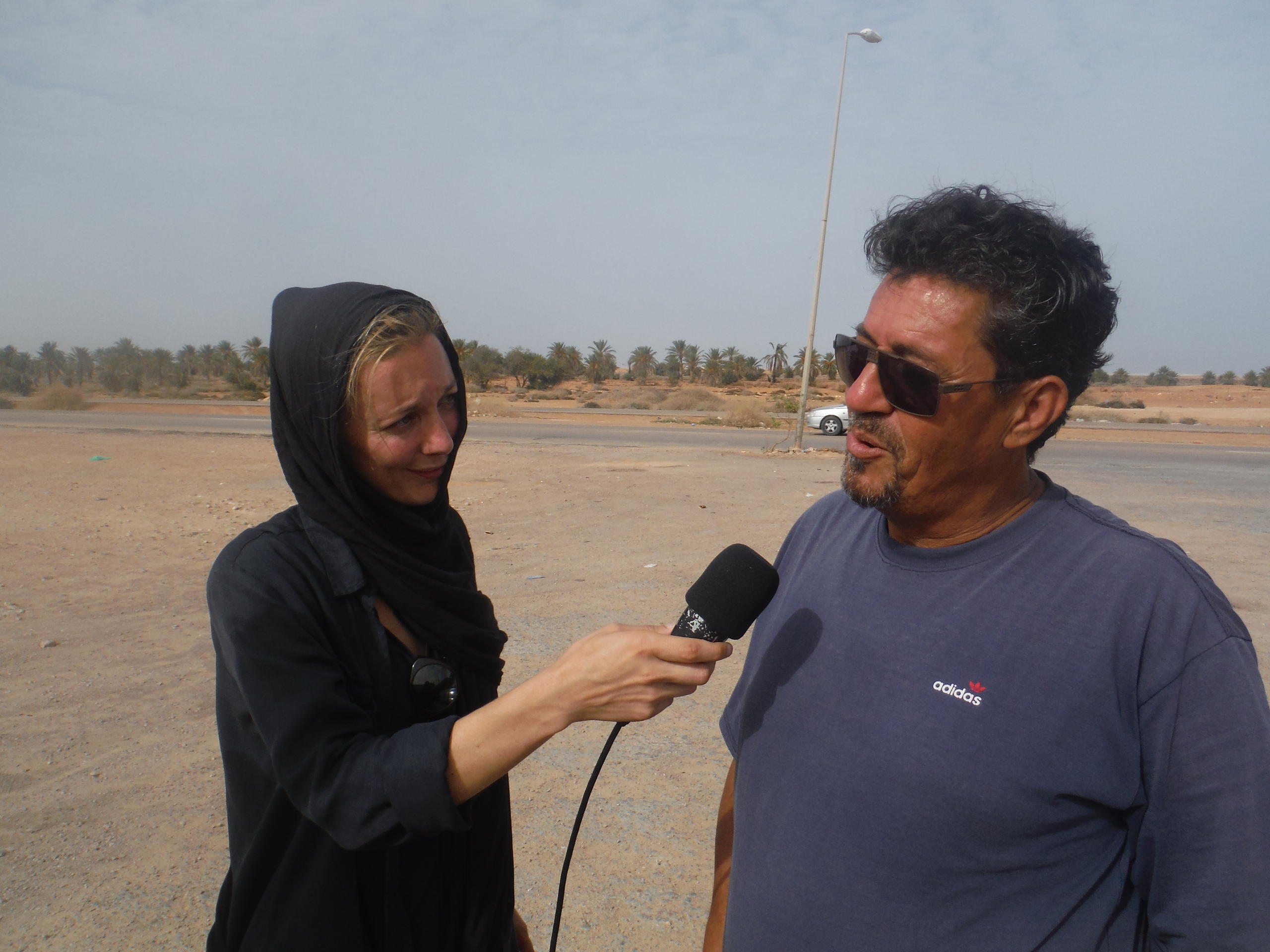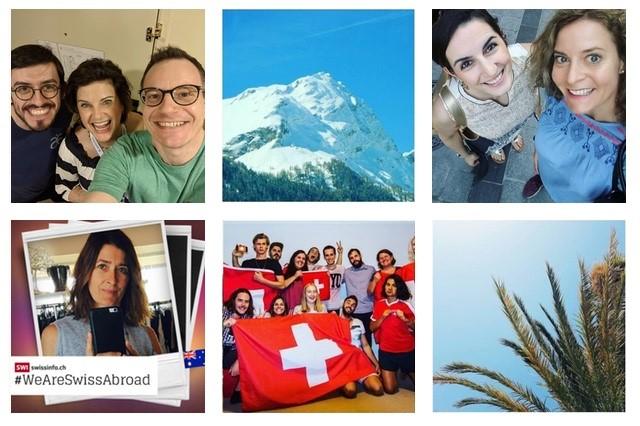
Maurine Mercier: ‘Journalism is a link between cultures’

Swiss journalist Maurine Mercier started to take an interest in the Arab-Islamic culture and its societies after completing her studies in international relationships at the Geneva Institute for International and Development Studies. The former war reporter wants to give Muslims a voice.
Mercier did not have the slightest hesitation when the French-speaking arm of Switzerland’s public television station Radio Télévision Suisse (RTS) offered her a job as a correspondent in Tunisia. Now the journalist from canton Vaud whizzes back and forth between Tunisia and Libya to report about the region.
She usually reports between 6am and 9am. She provides listeners with background information about the events on the ground or interviews high-level people in both countries. Sometimes, she is on the radio between 6pm and 7pm and even as late as 10:30pm, depending on the events of the day.

In 2014, the daughter of a Swiss and a Canadian from Quebec received the Swiss Media Award for the best local radio reports. The judges selected her report about the train collision in Granges-près-Marnand in Canton Vaud in July 2013, in which she conveyed both conductors’ points of view of what happened that day.
Mercier then moved on to report from Eastern Ukraine about the separatists and the war in Donezk as well as from other trouble spots in the world. When asked why she decided to leave her successful career in Switzerland to go to such a small country like Tunisia, she answered: “After I had worked for RTS’ foreign desk, I went to Tunisia in May 2016. This move enabled me to continue to report on international events, such as the Charlie Hebdo affair.” Events that would trigger nightmares, she added.
This was not her only motivation for the move, however. When she was working for the foreign desk of RTS, Europe was hit by several terrorist attacks. In her view, the reporting gave a distorted picture of Muslims as they generally did not have the chance to comment on these events. “In difficult times like these, I think it’s the journalists’ obligation to give Muslims a voice,” Mercier says. “By letting them speak through our media, we have the opportunity to build bridges between the West and the Islamic world.”
But instead, she says, reports about attacks often lumped Muslims and terrorists together. “This undifferentiated reporting is wrong and dangerous. For this reason, I always make sure that I draw clear lines in my reports and don’t mix up the terms,” says Mercier, emphasising that her best friend was from Algeria.
A forgotten country
Giving the unheard a voice is important for the correspondent. “Libya is a war-ridden country that has been forgotten by Europe.” Even though travel between the two countries is sometimes tiring, she wouldn’t want to miss it. “It’s important to report about this isolated country.”
The same applies to Tunisia. Mercier’s interest in global conflicts, such as those in Ukraine or Libya, is rooted in her curiosity. She wants to understand the reasons behind the incidents. When she was a child, her father, who was born in 1939, already told her about the teachings of the humanist Jean Monnet, who was also known as the “Father of Europe” [added by translator].
Mercier explains how she was able to adapt to her new conditions. “When I told my friends and family that I would go to Tunisia, they were all worried about me – and these are educated and well-informed people,” she says. Her work in Tunisia differs from her work in Libya. “In Libya, it’s not a problem for me to visit a family at home as a woman. When I talk to people in the streets, my producer (who is a man) is always with me.”
Mercier can sense the confidence of her interviewees when they talk about issues she wants to find out more about. She was taken by surprise when the young men she interviewed in Tripoli after the revolution burst out in tears. “They told me that they could not cry in front of their wives.”
Mercier thinks that being a woman is actually an advantage for reporting in Libya. “In exceptional circumstances, there is more discretion towards women than men.” It’s also important to her to always respect social habits as well as laws. When reporting from Misrata, Libya, she covers her hair and wears baggy clothes. In Tunisia, on the contrary, she moves around freely and does not have to worry about covering up.
Link between cultures
For Mercier, it is important to understand the culture of the country she is living in. This is the only way for a journalist to act as a link between two cultures. For this reason, she applied for a sabbatical to dedicate her time to learning the language and understanding the culture shortly after she arrived in Tunis. The young Libyan man who usually accompanies her when on reportage also acts as her translator.
When asked whether she had not lost hope yet, Mercier responded without hesitation: “Quite the contrary – otherwise I would have left a long time ago.” She adds that she has never ceased to learn from people – men as well as women. “I want to stay here and immerse myself even more in the culture and the country,” she said. “I can still learn a lot about peace and women’s movements. I wish I could cover the whole region – from Morocco all the way to Libya.”
A kind of electricity
Mercier describes her passion for North Africa as a kind of “electricity”, which became charged up with more voltage after the Arab Spring. Her affinity for the region is not only down to cultural, social and professional aspects, it’s also the pleasant climate as well as the geographic and strategic location.
Even though Mercier mainly reports on affairs in Tunisia and Libya, she needs to be informed about changes and developments in the whole of North Africa. The news organisations she works for are mainly interested in migration across the Mediterranean, from north Africa to southern Europe.
Mercier lives in La Goulette, a district in northern Tunis. The Mediterranean city with its old Spanish fortress, white walls and vibrant colours is reminiscent of Nicosia, Cyprus, Malta, Sicily or Corsica. It might be the city’s unique flair that led the young woman from Lausanne to settle here.
Maurine Mercier was born in Lausanne. Shortly after starting her career as a journalist, she made a name for herself reporting for Swiss Radio and Television. She grew up with her paternal grandfather in Lausanne and went to school in Pully. Before she started school, she would speak French with a Canadian accent and only adopted the Vaud way of speaking French whilst at school. She began her journalism career as camerawoman for television, moved on to production and later took over other TV jobs before she switched to radio. This medium allowed her to do international reports, which was exactly what she wanted to do right from the start of her career as a journalist.
Are you a Swiss citizen living abroad? Label your Instagram photos with #WeAreSwissAbroadexternal linkExternal link.
The views expressed in this article are solely those of the author, and do not necessarily reflect the views of swissinfo.ch.

Translated from Arabic by Nicola Mohler

In compliance with the JTI standards
More: SWI swissinfo.ch certified by the Journalism Trust Initiative




























You can find an overview of ongoing debates with our journalists here . Please join us!
If you want to start a conversation about a topic raised in this article or want to report factual errors, email us at english@swissinfo.ch.